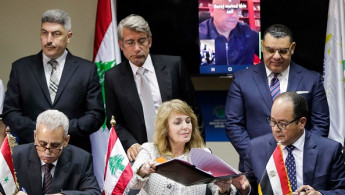Lebanon signs deal with Egypt, Syria to supply Beirut with natural gas
Lebanon, Syria and Egypt on Tuesday agreed to ship 650 million cubic metres of natural gas per year from Egypt to Lebanon via Syria, part of a US-backed effort to address Lebanon's crippling blackouts with electricity and gas transfers.
The deal, signed at a ceremony at the Lebanese energy ministry in Beirut, would see gas piped to Lebanon's northern Deir Ammar power plant, where it could add some 450 megawatts, or around four extra hours of power per day to the grid.
It still requires the approval of the World Bank, which has pledged financing, and the United States for compliance with its Syria sanctions regime, Lebanon's caretaker energy minister Walid Fayad told Reuters.
Fayad announced the agreement alongside representatives from Egypt and Syria, as well as Magdy Galal, chairman of the state-owned Egyptian Natural Gas Holding.
They did not disclose the financial terms, but Galal said Egypt would "offer an appropriate and preferential price".
Lebanon's state-run power company produces just a couple hours of power per day, forcing many to pay for expensive private generator subscriptions.
To ease the power crunch, a plan was floated last year for Lebanon to receive electricity from Jordan and natural gas from Egypt, both via Syria, which would add up to 700 MW to Lebanon's grid.
The World Bank had agreed to provide financing if Lebanon enacts long-awaited power sector reforms to reduce waste and boost tariff collection.
Lebanon's cabinet passed a broad electricity reform plan in March but has yet to implement key components.
The transmission through war-ravaged Syria had also prompted concerns about exposure to US sanctions under the wide-ranging 2019 Caesar Act, which penalises anyone dealing with the government in Damascus.
US officials say they have given countries "pre-clearance" to engage in talks without the spectre of sanctions but could only fully determine compliance once contracts were signed.
Fayad said he hoped the new deal would pave the way for World Bank financing and US sanctions waivers, saying "I think we did everything that they asked for".
Asked by Reuters when the gas could start flowing, he said, "Ask the World Bank. As soon as they approve the financing we're good to go".
He added Lebanon was also seeking Washington's all-clear on sanctions.
There was no immediate comment from the US embassy or the World Bank office in Lebanon.
(Reuters)





 Follow the Middle East's top stories in English at The New Arab on Google News
Follow the Middle East's top stories in English at The New Arab on Google News


